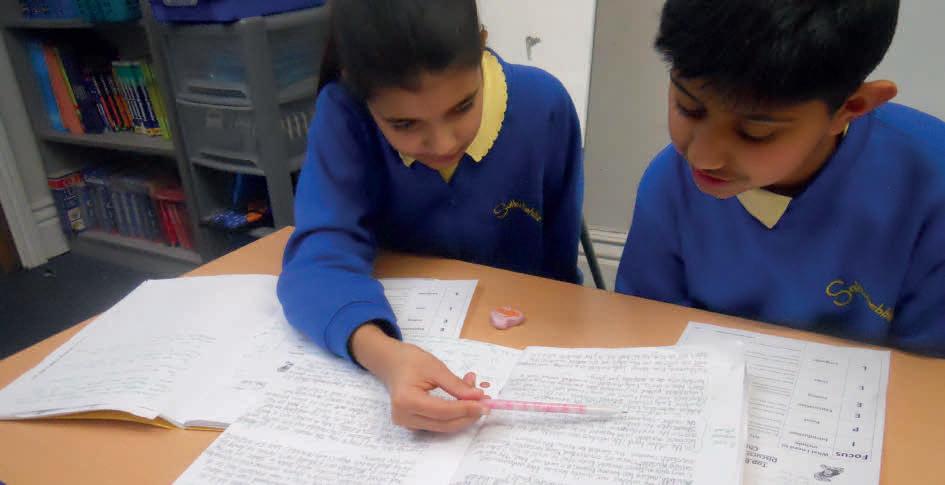
5 minute read
Further resources and support from the National Lieracy Trust
Further resources
As part of your participation in this training programme your school has become a premium member of the National Literacy Trust for 12 months. This means you can download the wealth of templates and examples of IPEELL texts to print and/or adapt for your teaching through the participants’ area here: https://literacytrust.org.uk/resources/improving-writing-key-stage-2-participants-area/ Membership also means you can access a huge range of additional online resources for writing and other literacy themes, and so can other members of staff in your school. Further, your school can take advantage of the generous partner discounts we have negotiated for our members, for example, 33% discount on orders with Browns Books for Students.
School improvement planning
Two core resources we recommend when you first explore your membership are the Primary Literacy Guide, which is a compilation of recent research and policy
THE PRIMARY LITERACY RESEARCH AND POLICY GUIDE 2017/2018
4. WRITING
The importance of engagement and enjoyment is explicit within the wholeschool writing policy. The importance of an engaging, purposeful and experiential writing curriculum is evidenced in policy and its rationale communicated to all stakeholders. All stakeholders within the school and wider community are encouraged to
model and discuss their daily writing
habits, from kitchen staff to parents and governors – both personal and workrelated writing. A regular school newspaper, radio station or blog is established and run by the pupils to encourage writing for purpose in a real context and improve whole-school communication. Teachers as writers: teachers model and discuss their own writing habits and attitudes. Teachers share successes and preferences in writing styles and model use of writing journals.
Teachers have a commitment to ensuring all pupils see themselves
as writers, despite their level of competency in terms of transcription, and demonstrate enthusiasm for the creative process of the communication of ideas – the heart of the writing process. Pupils host their own writing groups both in and out of school, in person or via a virtual forum. Pupils have opportunities via the internet to correspond with pupils in other school communities, both nationally and internationally; sharing poems, stories, information, etc.
WRITING CULTURE
WHOLE SCHOOL
Pupils’ writing, both formal and informal, is displayed and celebrated publicly, for example on notice boards and pupil-voice boards, and in school council notes. A range of writing from across the curriculum (fiction and non-fiction) is displayed and school and class assemblies are used to celebrate.
Parents are encouraged to participate
in writing events and competitions alongside pupils. Parents have opportunities to attend
after-school writing clubs and workshops.
All stakeholders have awareness and
knowledge of the impact of enjoyment
on pupils’ writing attitudes and attainment. The classroom environment and working walls demonstrate and celebrate all forms of writing; formal, informal, multi-modal and digital.
PUPILS
Surveys and reflection activities are used to explore pupils’ attitudes and writing behaviours. Pupils share and encourage younger pupils in their writing journeys and preferences to inspire writing for pleasure. Pupils have regular opportunities to write for a real purpose and audience within the school community, for example contributing to school communications, emails, website content, signage, school council messages, governor enquiries, events advertising and invitation, and questionnaires. Research and knowledge of barriers to writing for specific groups of pupils (e.g. boys) are used to explore and identify priorities for targeted focus and whole-school improvement. Research on the importance of writing enjoyment is disseminated and explored through staff development and governor/ parental updates. Teachers keep up to date with national and local writing competitions and integrate these opportunities for motivating young writers into the curriculum. Pupils are encouraged to write for personal pleasure in a range of different forms; writing journals, diaries, online blogs. Pupils design and create their own writing spaces throughout the school environment. Pupils have opportunities to produce publications for the local community, for example a local history guide, information leaflets for local charities, businesses and groups and book recommendations for
the local library. Pupils are encouraged to explore writing in a range of different spaces across the whole school; outdoor writing areas, interactive word walls, graffiti walls, poetry corners, library zones.
Regular visits from authors are organised to motivate pupils and to provide a focus for events to explore and celebrate
STAFF
writing for all stakeholders. The school hosts a writers group for staff and achievements are shared with other staff and pupils.
Copyright © National Literacy Trust 2017 (Primary Annual Literacy School Review). You may use this resource freely in your school or setting but it cannot be reproduced, modified or used for commercial purposes without the express permission of the National Literacy Trust.
membership@literacytrust.org.uk www.literacytrust.org.uk
developments in literacy to support you in building evidence-based practice, and the Annual Literacy Review, a set of posters to help evaluate your current literacy provision and develop an action plan for moving forward.
Your membership also gives you discounts on our other training and professional development opportunities. Please browse the online menu or email schools@literayctrust.org.uk for further information.
For a range of ideas and engaging activities for parents and carers to support their children’s literacy, please explore our parent-facing website: http://www.wordsforlife.org.uk.
ABOUT THE NATIONAL LITERACY TRUST
The National Literacy Trust is an independent charity that transforms lives through literacy. One person in six in the UK is held back by poor literacy skills which compromise employability, health, confidence and happiness. We improve reading, writing, speaking and listening skills in communities where poverty is on the increase and where literacy levels are low. Our research and analysis make us the leading authority on literacy and drive our interventions. We campaign to make literacy a priority for politicians and parents and provide schools with resources to transform their literacy teaching. Our work is focussed on the critical moments in literacy development where we can make the greatest impact. To find out more, donate or sign up for our free email newsletter visit www.literacytrust.org.uk.
T: 020 7587 1842 E: contact@literacytrust.org.uk www.literacytrust.org.uk
Find us on Facebook facebook.com/nationalliteracytrust Follow us on Twitter @Literacy_Trust Sign up for our free email newsletter at www.literacytrust.org.uk/newsletter
The National Literacy Trust is a registered charity no. 1116260 and a company limited by guarantee no. 5836486 registered in England and Wales and a registered charity in Scotland no. SC042944. Registered address: 68 South Lambeth Road, London SW8 1RL.
Patron: HRH The Duchess of Cornwall








